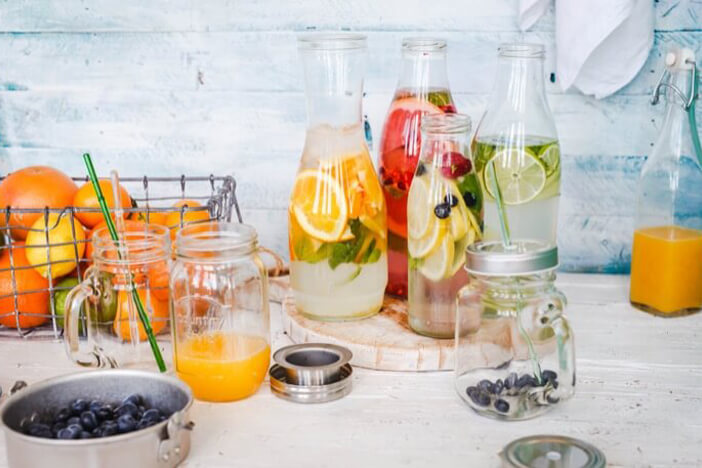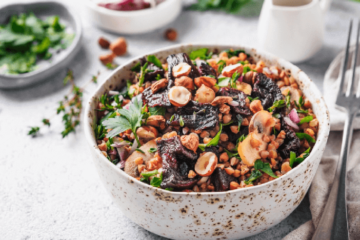Sugary drinks - how liquid sugar affects our body

Drinks
Juice — a breakfast staple. For many people drinking a glass of vitamine packed juice is a morning ritual needed to start the day right. They feel fitter, in a better mood and it gives them the feeling that they are treating their body right. However, is this really the case? Is juice actually as rich in vitamins and healthy as is commonly believed? To this day, many people drink several glasses of juice a day, such as apple juice or orange juice, without actually knowing what is in these small, sugary calorie bombs.
Juices contain as much sugar as fizzy drinks
Sugar content - Juices vs. fizzy drinks
Many people are unaware that whether you drink a glass of juice or a glass of cola makes little difference in terms of sugar. It is often said that juices with fructose contain “healthy sugar”. However, scientists have long agreed that fructose also has bad properties. In fact fructose is the second most common cause of fatty liver after alcohol.
Futhermore, many juices are additionally sweetened with sugar to create the intensely sweet taste. If you don’t want to ban fruit drinks completely, you should try smoothies. Smoothies are also high in fructose, but contain a lot of fibre. The fibre helps with digestion and prevents food cravings after the fructose has been absorbed. Smoothies can therefore be viewed as a partially healthy alternative.
In that case, why not just drink fizzy drinks - it doesn't really make a difference, does it?
It’s a clear no— it does matter! Sugary drinks are the main cause of obesity and diet related diseases. Soft drinks, for example, contain about 9 g of sugar per 100 g making one glass (about 250 ml) contribute heavily to your daily calorie intake. The daily recommended amount of sugar by the PHE is around 30 g. Meaning, that a 250 ml glass already covers half of your daily requirement. Sugar should be consumed in moderation, as the body digests sugar very quickly and you quickly get cravings again. Sugary drinks also trigger this.
The situation is similar with juices. Juices might contain important vitamins and nutrients, but this is outweighed by the high amount of sugar they contain. You should also be careful with iced tea. Although it is often advertised that the aroma of the drink comes from the natural tea element, the sweet taste is actually artificially created by sugar. A healthier alternative is a self-brewed tea, which you allow to cool overnight and sweeten with a little honey or agave syrup.
How do drinks affect my diet?
Generally, it is best to avoid sugars and sweeteners in drinks as much as possible. Something many people might not realise is that drinks affects reaching your goals as much as food does. In many countries the most common causes of obesity are sugary soft drinks and juices, many people are unaware that these drinks contain “hidden calories”.
These hidden calories mainly come from the added sugar. Coffee and tea lovers should also try to avoid sweetening with sugar. Also in relation to our interactive nutrition plans, it is important that the fluid intake is healthy and sufficient. Our new drink tracker helps you to check whether you are consuming enough liquid daily.
Danger zone sugar

Sugar as a disease trigger
There are many myths and findings about sugar. The most important findings about sugar show why it is best to keep sugar consumption as low as possible. Sugar increases the risk of many serious diseases such as diabetes and is a common cause of obesity. The risk of cancer also increases significantly as the cancer cells feed on sugar. Consuming too much sugar increases the risk of becoming addicted. The body “gets used” to the sweetness of sugar, which means that you need more and more sugar to get the same sweetness sensation.
Sugar in drinks
Especially when consuming sugary drinks such as juices and soft drinks, it is easy to lose track of how much sugar you are consuming. The main reason for this is that after drinking sugar, there is no feeling of satiety, as would be the case with food. Therefore, especially with sugary drinks, it is important to pay attention and keep your consumption moderate. Even better would be to find alternative drinks that are healthy.
Sugar substitutes
Are light drinks a good alternative? No, even light drinks are best consumed in moderation. The added sugar substitutes often cause food cravings. The insulin content in the body rises sharply after consuming the light drinks and falls again just as quickly, which leads to food cravings. The same phenomenon occurs when consuming sugar. Additionally possible long-term effects of sugar substitutes on humans are not yet known. So if you are aiming for a healthy and balanced diet, you are better off avoiding these substitutes.
Healthy alternatives

Infused water
So, I can only drink tasteless water from now on? The answer to this is – Infused Water! If water is too tasteless or “boring” for you, you should definitely try this new hit among beverages. Infused water is nothing more than water, which is pepped up by the natural aromas of fruits, herbs and veggies.
Chop up some of your favorite fruits or veggies and put into a bottle and then pour water over them. With Infused Water there are no limits to your creativity. The advantage is clearly that the ingredients release their vitamins, minerals and antioxidants into the water. The fruits, veggies and herbs are low in calories, so the infused water is both nutrient-rich and low in calories. In addition the fruits, herbs and veggies give off their natural aromas, which gives the drink a fresh and fruity taste. Infused water is therefore a delicious and low-calorie all-rounder that helps you to achieve your daily intake of liquids with pleasure.
Advantages of Infused water
Infused water is not only delicious and nutritious, it also has a stimulating effect on the metabolism. Many of the released ingredients, such as vitamin C from lemon and melon, stimulate fat burning. Those who dare adding ginger will be doing something good for their gut flora. Ginger has an antibacterial effect and helps regulate the intestines. The released ingredients also give the water a fresh taste and provide the body with important nutrients, which makes you feel generally fitter. The biggest advantage – you can drink as much of it as you want without having to worry.
Like the sound of this? Then try out our delicious free infused water recipes:
Example recipes for infused water
| Ingredient 1 | Ingredient 2 | Ingredient 3 | Ingredient 4 |
|---|---|---|---|
| 1 lemon | 2 sprigs of mint | 1 handful of raspberries | 1 l water |
| 1 apple | 1 cinnamon stick | 1 l water | |
| 2 kiwis | 2 handfuls of strawberries | 1 l water | |
| ½ cucumber | 1 lemon | 1 slice of ginger | 1 l water |
| ¼ watermelon | 2 sprigs of mint | 1/4 honeydew melon | 1 l water |
Instructions for 1 l of infused water
- Prepare fruits, veggies and herbs and cut them into slices and/or pieces
- Fill the glass, carafe or bottle with your ingredients.
- Then pour water into the container.
- Let infused water sit in the refrigerator for at least 3 hours.
Tips for your infused water
- It is best to prepare your infused water for the next day in the evening, so the aromas have all night long to unfold.
- To get the flavours out even better, partially pour warm water over the ingredients and then fill up with cold water before letting it sit overnight.
- If you have already drunk half of your infused water, refill with cold water so that you can enjoy the flavours throughout the day.
- Especially when you like infused water with berries, it makes sense to build up a stock of frozen fruits. Frozen fruits are usually even more aromatic, as they have been frozen shortly after harvesting and therefore hardly lost any aroma.
- Be creative! You can adapt your infused water to suit you. Use what you like.
Sources
- M. Rabenberg, G. Mensink (2013): Limo, Saft & Co-Konsum zuckerhaltiger Getränke in Deutschland
- Die Bedeutung des Verzehrs von Mono- und Disacchariden in Getränken für die Entwicklung von Übergewicht und die Gesundheit; Georg Thieme Verlag KG Stuttgart; New York
- https://www.noz.de/deutschland-welt/gut-zu-wissen/artikel/785775/infused-water-das-steckt-hinter-dem-trendhttps://www.google.com/search?
- https://utopia.de/ratgeber/ingwer-wirkung-gesund/


